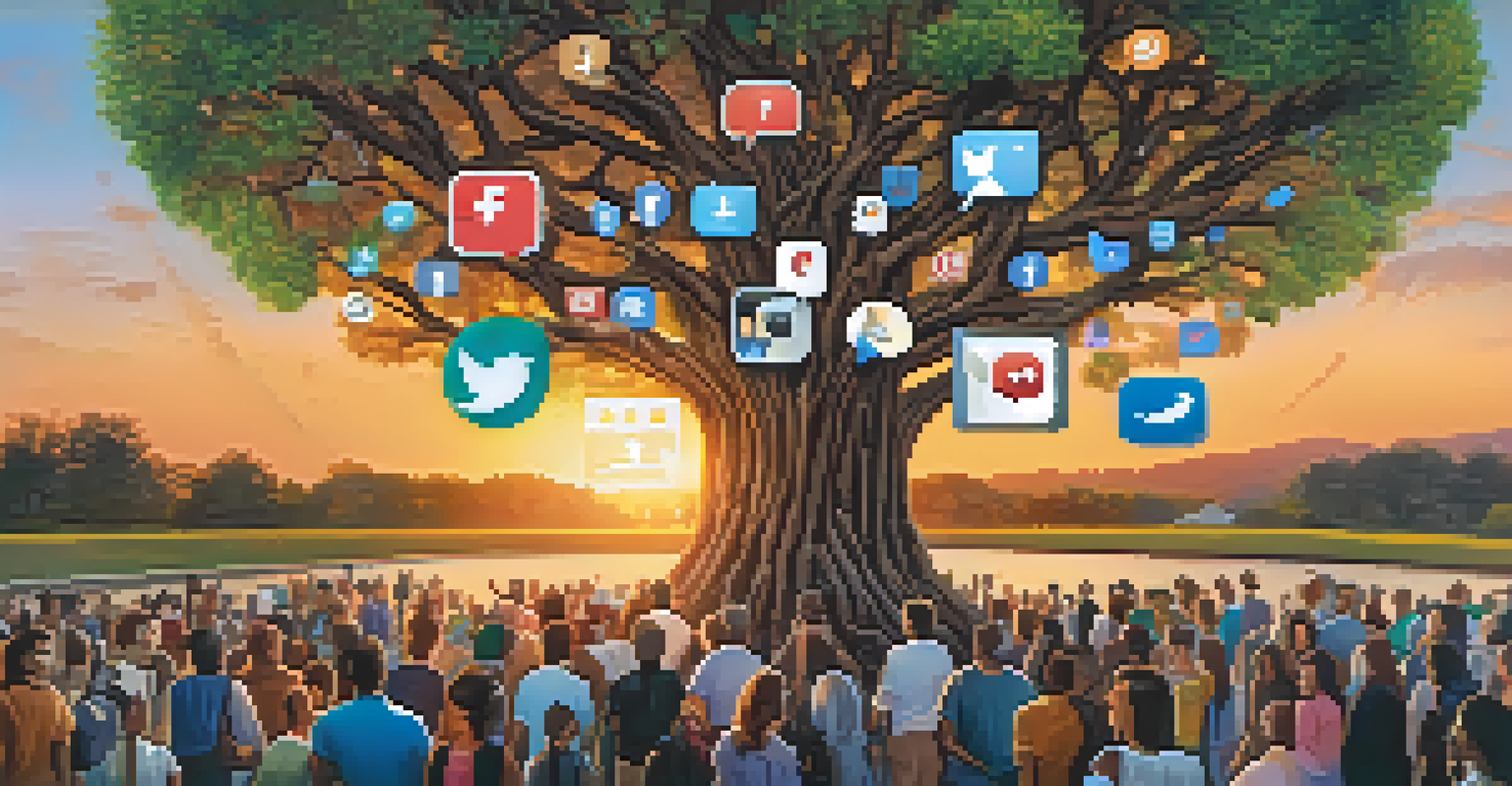Understanding the Role of Digital Citizenship in Democracy

What is Digital Citizenship and Why It Matters
Digital citizenship refers to the responsible use of technology and the internet. It encompasses various aspects, including online etiquette, digital literacy, and the ability to engage in civic activities online. Understanding digital citizenship is crucial in today's interconnected world, where online platforms play a significant role in shaping public discourse.
The internet is becoming the town square for the global village of tomorrow.
In a democracy, citizens are expected to participate actively in decision-making processes. Digital citizenship empowers individuals to do this by providing the tools and knowledge to engage with their communities, share opinions, and advocate for change through online channels. This digital empowerment is essential for a healthy democratic society.
Moreover, as more people turn to the internet for news and information, the ability to navigate digital spaces responsibly becomes vital. Digital citizenship not only promotes informed participation but also helps combat misinformation, which is a growing concern in modern democracies.
The Connection Between Digital Citizenship and Civic Engagement
Civic engagement involves actively participating in the public life of a community, and digital citizenship plays a significant role in this process. Through social media platforms, blogs, and forums, individuals can voice their opinions, connect with like-minded people, and mobilize support for various causes. This online engagement can translate into real-world activism, further strengthening democratic practices.

For instance, movements like #BlackLivesMatter and #MeToo gained momentum through digital platforms, showcasing how online engagement can lead to significant societal changes. Citizens utilizing their digital rights effectively can amplify their voices, impacting policy discussions and community initiatives.
Digital Citizenship Empowers Democracy
Understanding digital citizenship equips individuals with the tools to engage actively in democratic processes and advocate for change online.
However, it's essential to recognize that not everyone has equal access to digital tools and the internet. This digital divide can limit civic engagement for certain groups, making it crucial to promote inclusivity in digital citizenship education to ensure everyone can participate in democracy.
The Importance of Digital Literacy in Democracy
Digital literacy is the ability to find, evaluate, and communicate information in various digital formats. In a democratic context, being digitally literate means that citizens can critically assess the information they encounter online and make informed decisions. This skill is essential for navigating the vast ocean of content available on the internet.
In a democracy, the highest office is the office of citizen.
For example, understanding how to spot fake news or biased reporting is a key aspect of digital literacy. When citizens can discern credible sources from unreliable ones, they are better equipped to engage in informed discussions and contribute to democratic processes.
Moreover, fostering digital literacy helps individuals become more responsible digital citizens. As they learn to engage thoughtfully with online content, they can participate in healthier discussions and contribute positively to the digital landscape.
Navigating Online Discourse: A Challenge for Citizens
Online discourse can often be polarizing, which presents a challenge for digital citizens. Social media algorithms tend to create echo chambers, where individuals are exposed primarily to viewpoints that mirror their own. This can hinder constructive dialogue and compromise the democratic process.
To navigate this challenge, digital citizens must cultivate critical thinking skills and seek out diverse perspectives. Engaging with differing opinions can lead to more meaningful conversations and a better understanding of complex issues, ultimately enriching the democratic experience.
Digital Literacy is Crucial Today
Being digitally literate enables citizens to critically assess information, making informed decisions essential for healthy democratic participation.
Moreover, encouraging respectful and open-minded discussions online can help bridge divides and foster a more inclusive political environment. As citizens learn to engage with others in a constructive manner, they contribute to the overall health of democracy.
The Role of Social Media in Shaping Democratic Values
Social media has revolutionized how citizens engage with democracy. Platforms like Twitter and Facebook enable users to share news, mobilize support for causes, and participate in discussions about political issues. This immediacy and accessibility can enhance democratic participation, especially among younger generations.
However, the influence of social media goes both ways. While it can empower citizens, it also raises concerns about the spread of misinformation and the manipulation of public opinion. Digital citizenship education helps individuals understand these dynamics and equips them to navigate social media responsibly.
Ultimately, the role of social media in democracy is complex, but when used thoughtfully, it can serve as a powerful tool for civic engagement and the promotion of democratic values.
Challenges of Digital Citizenship in a Global Context
Digital citizenship is not just a local issue; it extends globally, presenting unique challenges across different cultures and political systems. In some regions, citizens may face censorship or restricted access to information, limiting their ability to engage in democratic processes. This highlights the need for a global understanding of digital citizenship that respects diverse contexts.
Additionally, the rise of cyberbullying and online harassment complicates the landscape of digital citizenship. These negative behaviors can deter individuals from participating in online discussions and diminish the overall quality of civic engagement. Addressing these challenges requires collective efforts from individuals, organizations, and governments to foster a safer online environment.
Social Media Shapes Civic Engagement
While social media enhances democratic participation, it also poses challenges like misinformation, making responsible digital citizenship education vital.
Moreover, promoting digital citizenship on a global scale encourages cross-cultural dialogues and collaboration. By sharing best practices and learning from each other, citizens can enhance their digital skills and contribute positively to their communities, regardless of their geopolitical context.
The Future of Digital Citizenship and Democracy
As technology continues to evolve, so too will the concept of digital citizenship. Emerging technologies like artificial intelligence and virtual reality are likely to shape how citizens engage with democracy in unprecedented ways. It is crucial for individuals to adapt and understand these new tools to remain active participants in democratic processes.
Education will play a key role in this evolution. By incorporating digital citizenship into school curriculums, future generations can gain the skills necessary to navigate an increasingly complex digital landscape. This proactive approach will help ensure that citizens are prepared to face the challenges and opportunities that lie ahead.

Ultimately, the future of digital citizenship is intertwined with the health of democracy itself. By fostering a culture of responsible digital engagement and promoting inclusivity, we can create a more vibrant and participatory democratic society for all.